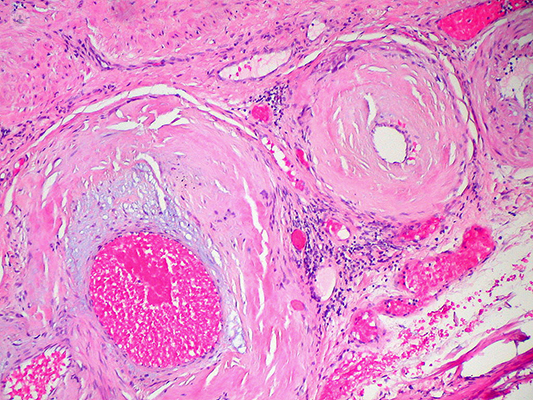


What is amyloidosis?
Amyloidosis is a disorder in which abnormal proteins build up in organs and tissues. These proteins are known as amyloids and can hinder tissue and organ function. This disease can affect the intestines, the tongue, the skeletal and smooth muscles, ligaments, skin, liver, kidneys, spleen, heart, nervous system, and digestive tract.
Amyloidosis can cause serious damage to tissues and even organ failure, particularly kidney failure, heart failure, and impaired nervous system function, which can in turn affect the patient’s sensation of touch or affect the nerves that control bowel function. It can be involved in carpal tunnel syndrome, kidney problems, neuropathy, cardiomyopathy or intestinal mal-absorption among other issues.
Types of amyloidosis include:
- AL amyloidosis (immunoglobulin light chain amyloidosis) – the most common type, affecting the heart, kidneys, skin, nerves and liver. It was previously called “primary amyloidosis”. It occurs when abnormal antibodies are produced by the bone marrow.
- AA amyloidosis – previously known as “secondary amyloidosis”. It usually affects the kidneys, but can also occur in the digestive system, heart, or liver.
- Hereditary amyloidosis (familial amyloidosis) – caused by gene abnormalities, it usually affects liver, nerves, heart and kidneys, but can appear in a number of locations and progresses differently according to which genes are the root cause.
- Dialysis-related amyloidosis – causes pain and stiffness in the joint, and can also lead to carpal tunnel syndrome.
What are the symptoms of amyloidosis?
Symptoms of amyloidosis vary, depending on the organs and tissues that are affected. They usually include any of these symptoms:
- Fatigue
- Irregular heartbeat
- Difficulty breathing
- Numbness or tingling in the hands and feet
- Swelling in arms and legs
- Swelling of the tongue
- Difficulty swallowing (dysphagia)
- Fatigue and weakness
- Weight loss
- Joint pain
- Diarrhoea or constipation
- Decrease in urine output
- Voice changes or hoarseness
Causes of amyloidosis
Amyloidosis is related to an abnormal, excessive production of amyloid proteins which may be partly due to genetics (in the case of hereditary amyloidosis). When there is a surplus of proteins in the body, they accumulate in certain organs and tissues and do not allow them to work properly.
Can it be prevented?
There is no prevention method for amyloidosis, so an early diagnosis is very important to start treatment as soon as possible.
What is the treatment for amyloidosis?
Unfortunately, there is no direct cure for amyloidosis, as the amyloid deposits cannot be removed. However, the production of these amyloids can be stopped and symptoms can be treated. This can help you’re your body time to clear the amyloid deposits on its own before organ damage sets in.
Amyloidosis can be treated with:
- Chemotherapy – this can destroy abnormal bone marrow cells that are producing the amyloids
- Steroids – these may be given to aid the chemotherapy drugs
- Stem cell transplantation
